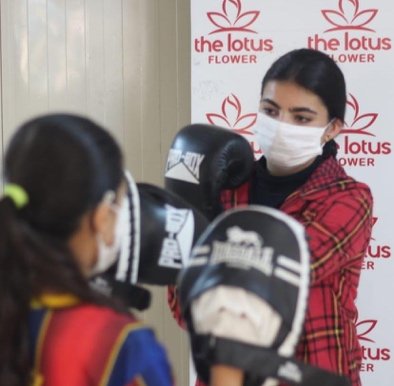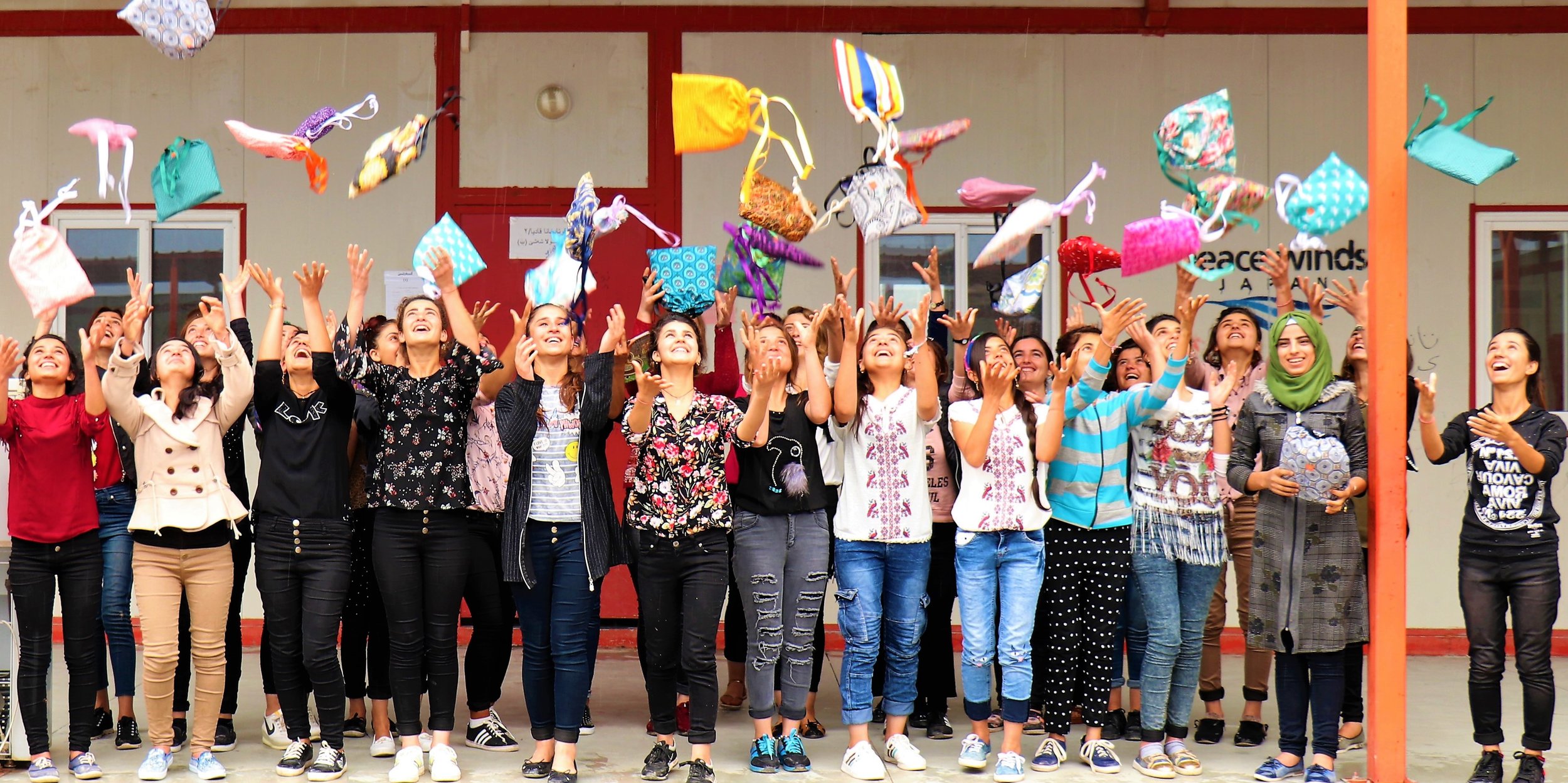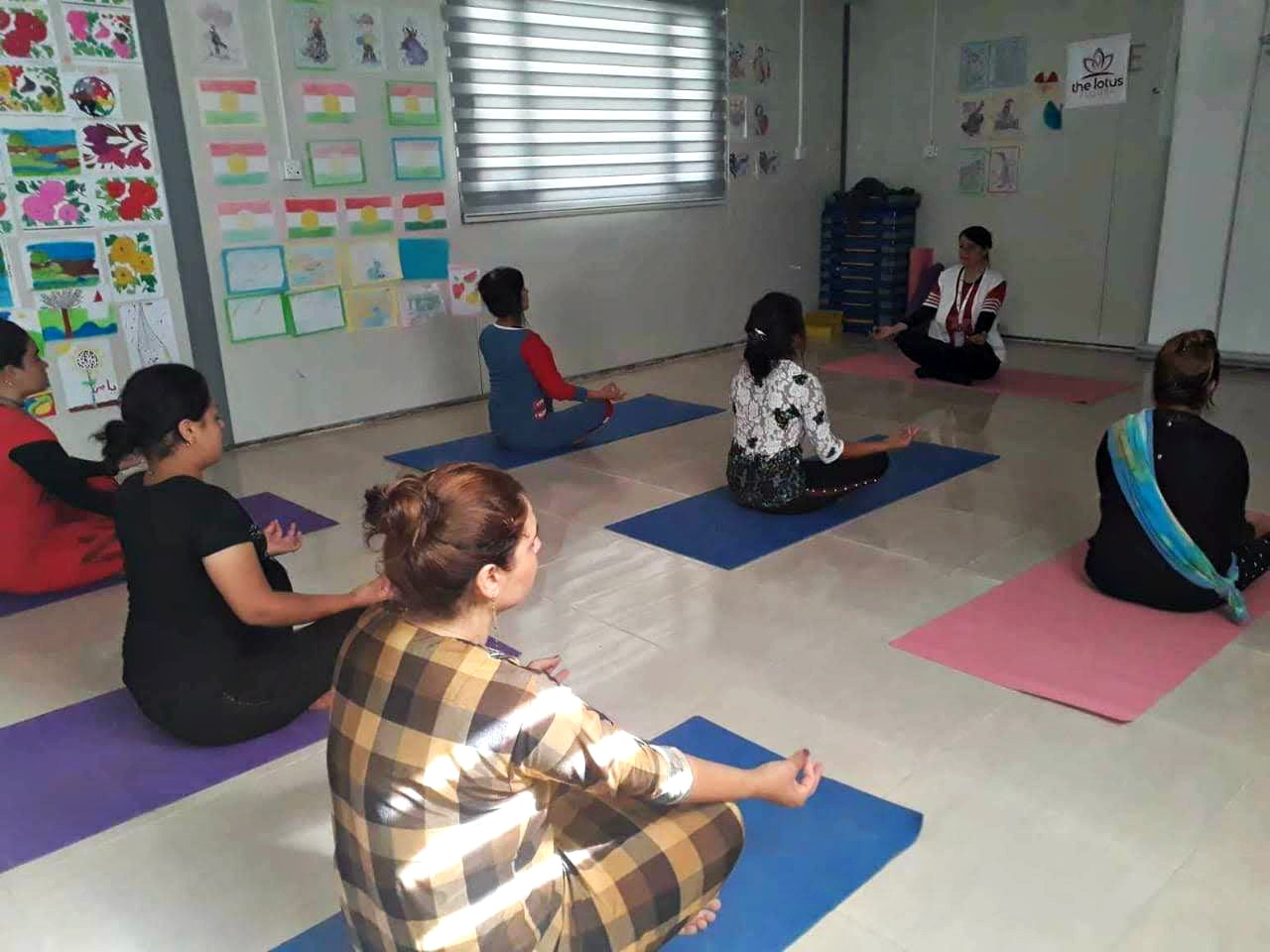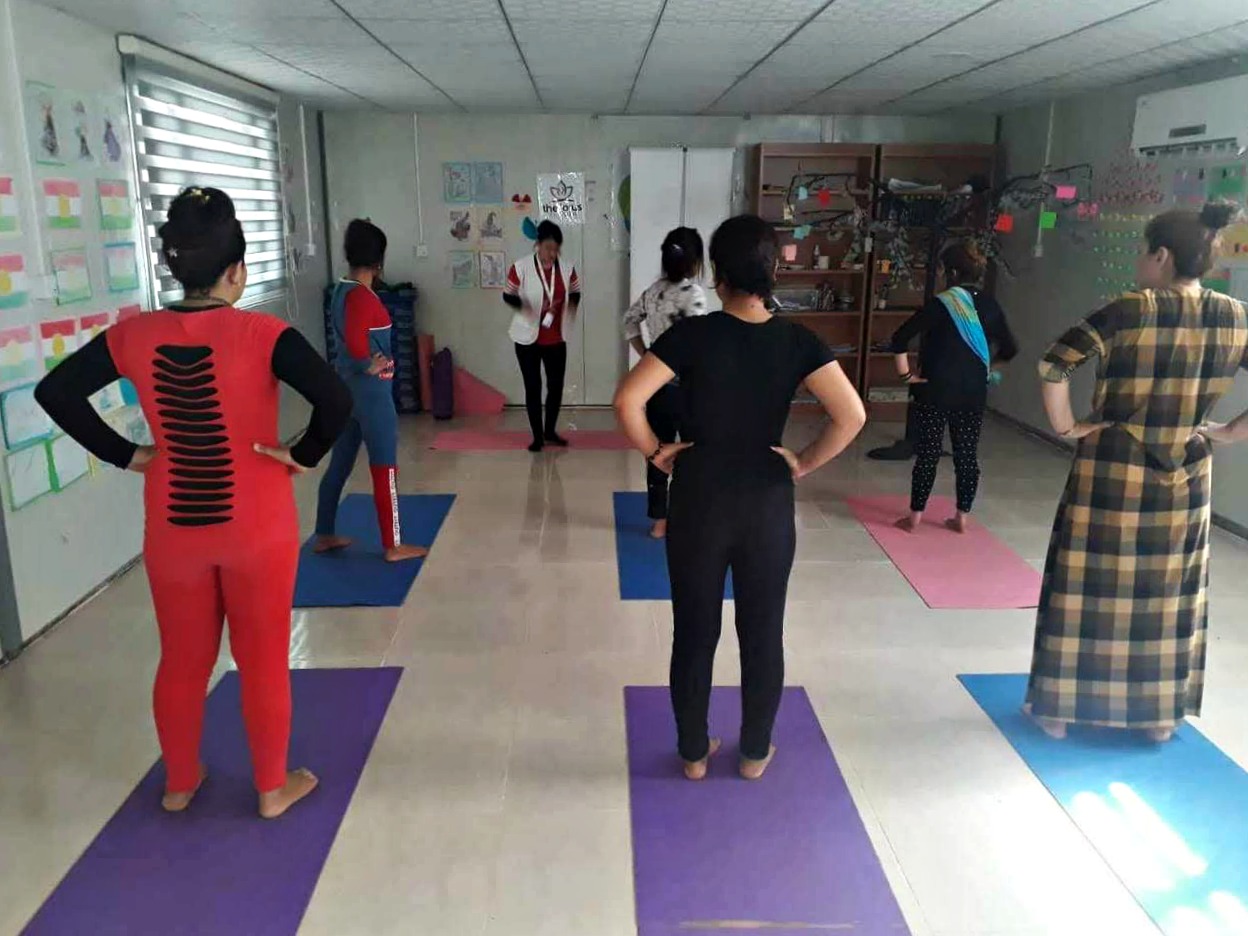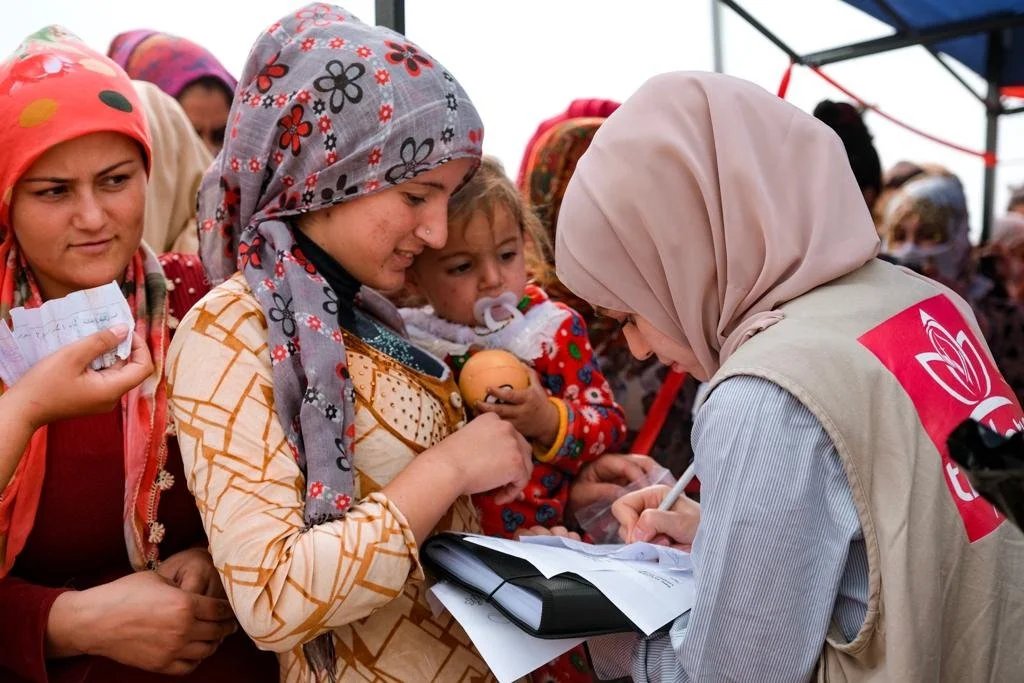Child protection
Our Child Protection project is in partnership with UNHCR sees us working to protect vulnerable children from violence, abuse, exploitation and discrimination, while providing them with access to necessary support services, and enhancing their social and emotional wellbeing.
Activities include games and sports, art, music and singing, as well as non-formal educational classes in English language.
Our Child Protection project is in partnership with UNHCR sees us working to protect vulnerable children from violence, abuse, exploitation and discrimination, while providing them with access to necessary support services, and enhancing their social and emotional wellbeing.
Activities include games and sports, art, music and singing, as well as non-formal educational classes in English language. We’re also providing much-needed psychosocial therapy aimed at improving their wellbeing and building cohesion, with priority given to those with specific mental health or protection concerns. Case management is also being provided for the most at-risk children, to ensure they receive access to services such as emergency cash assistance and medical support.
Other activities for children include awareness-raising and resilience sessions on topics like bullying and hygiene. Additionally, we’re supporting refugee parents and caregivers, providing sessions on how to deal with children and young people’s psychological needs.
As part of the project, the Lotus Flower has also been supporting and building the capacity of three community-based organisations – ROJ, Gashbun and Hevi – to provide activities for vulnerable refugee and asylum seeker children from Syrian and non-Syrian backgrounds.
Finally, the project includes capacity-building training on Child Protection measures for government staff and other community organisations and partners.
Boxing Sisters
Our Boxing Sisters project was originally set up with the help of Cathy Brown, a retired professional British boxer and certified Cognitive Behaviour Therapist. Inspired by Cathy, the boxing and self-defence taught by our trainers teaches girls about strategy and focus, relieves stress and increases their confidence as well as physical strength. By learning self-defence techniques, women and girls feel more secure knowing that they can protect themselves.
Our Boxing Sisters project was originally set up with the help of Cathy Brown, a retired professional British boxer and certified Cognitive Behaviour Therapist. Inspired by Cathy, the boxing and self-defence taught by our trainers teaches girls about strategy and focus, relieves stress and increases their confidence as well as physical strength. By learning self-defence techniques, women and girls feel more secure knowing that they can protect themselves.
The classes also help with anger management, as the physical activity allows pent-up feelings and trauma to move through the body and be released from the muscles. Finally, the project builds friendships and a community, because the Sisters always have a coach and a sparring partner.
Since the first iteration of Boxing Sisters, the programme has grown hugely, and is now one of our most popular and in-demand projects.
Cathy Brown, co-founder of Boxology Academy
CASE STUDY
As one of our younger beneficiaries, Rushna has found our regular girls’ boxing classes to be hugely beneficial – for both her mental and physical wellbeing. “I really enjoy boxing because it makes me feel strong,” she says. “I hope one day to be a boxing trainer myself, so I can teach other women and girls to defend themselves. It’s not all about physical strength, but it also gives you a strong sense of self-confidence and self-determination to face the difficulties in our lives. I want to share that with other young girls.”
Rushna also finds great comfort in visiting our women’s centre, adding: “It gives me opportunities to learn new skills and meet new friends, so we can spend time together instead of being stuck in our accommodation.”
Mental Health and Psychosocial Support
We offer a variety of programming to support mental health including awareness sessions, group discussions, art therapy (painting and knitting), community outreach and home visits. Topics include SGBV prevention, domestic violence, emotional abuse, prevention of early marriage, women’s rights.
Refugees and displaced people suffer from depression, anxiety and symptoms of post-traumatic stress disorder at rates of at least three times higher than the wider population. Younger females also experience severe psychological trauma after fleeing their homes and many struggle with the pervading sense of uncertainty and distress. Attempted suicide is increasingly common – especially as a result of the pandemic, when lost incomes and enforced isolation caused mental health disorders to rise dramatically.
We provide individual and group mental health support with trained psychologists, who are equipped to provide suitable treatment plans for each individual. Each case is treated with the utmost respect and sensitivity – which is essential given that many women and girls have experienced gender-based violence or sexual exploitation or abuse in a family setting.
Our centres incorporate individual and peer-to-peer support in all programming, and our safe social spaces encourage women and girls to support each other. Cultural and social sensitivities are also carefully considered. We also provide wellbeing programmes including yoga, mindfulness, group exercise, and related awareness sessions.
CASE STUDY
Nazdar was just 15 when her village was invaded by ISIS. Like so many others, she and her family were forced to flee their home, and Nazdar suffered with prolonged menstrual bleeding as a result of anxiety and fear. Once in camp, she and her family of eight had no choice but to live in a very small tent, which was partly exposed to the open air. “It was very harsh,” says Nazdar. “My father was chronically ill and paralysed, and I suffered with terrible migraines caused by stress. I didn’t know what to do.”
Nazdar was put in touch with a Lotus Flower psychologist and began receiving counselling. She began to understand her anxiety, what triggered these feelings and crucially, how best to deal with them. By working out a therapy plan that suited her, Nazdar has gradually built up her recovery and coping mechanisms, and she says: “I feel so much better these days, and that has enabled me to take part in other Lotus Flower activities too. I have been doing boxing, photography and craft courses, which keep me busy and take my mind off other things. It also means I have developed new skills and have been able to meet and bond with other women.
“As well as feeling better, I’m now able to support my father and family, which means I can finally feel more positive about our future.”
Men and Boys’ Trauma Project
We worked with Khaima to implement a pioneering project aimed at supporting men and boy Syrian refugees who have been badly impacted by conflict and displacement. The programme was designed to foster healing through the sharing of past ordeals and mental health therapy, as well as providing educational and holistic activities to encourage self-expression and the processing of feelings through art, music and poetry.
Prior to our project, Domiz 2 camp had no mental health support, therapy or educational activities specifically for men and boys. According to local authority and community representatives who participated in consultation meetings we held, psychological disorders, suicidal tendencies and gender-based violence had all been rising sharply.
In response to this, we worked with Khaima to implement a pioneering project aimed at supporting men and boy Syrian refugees who have been badly impacted by conflict and displacement. The programme was designed to foster healing through the sharing of past ordeals and mental health therapy, as well as providing educational and holistic activities to encourage self-expression and the processing of feelings through art, music and poetry.
Many of the male beneficiaries saw the atrocities of war with their own eyes, and were beaten or threatened themselves. Others saw women being subjected to violence and abuse, and even innocent men being beheaded. Although they locked away their trauma for many years, intense feelings of anger and fear inevitably built up, which they had no way of articulating or managing. Feelings of shame and social stigma had also prevented them from opening up about their experiences, especially in relation to struggles with mental health.
For the initial project, 25 men and boys were selected to take part, and the feedback and results were so encouraging that we again collaborated with Khaima to deliver a second round of the project in early 2022.
CASE STUDY
Aziz* is a Syrian refugee and married father of two young children, who has lived at Domiz 2 camp for eight years. He says: “I was glad to participate in the Men and Boys' Trauma project and really liked the awareness sessions. I was pleased to improve my English too. The psychological sessions and therapy were impactful and unique for us as men. I had never participated in such programmes before and I believe 90% of other men and boys hadn’t either. This project has helped me improve my skills, rebuild my life and become a better father to my kids, and a better husband to my wife.”
* Aziz’s name has been changed to protect his identity.
Girls’ Hygiene
The Lotus Flower collaborates with partners including Operation Hope Australia, the Presbyterian Church and Days for Girls, in order to provide and promote sustainable solutions for female menstrual health. We implement menstrual health for girls aged between 12-16, who are currently living in the internally-displaced camps within Kurdistan.
The Lotus Flower collaborates with partners including Operation Hope Australia, the Presbyterian Church and Days for Girls, in order to provide and promote sustainable solutions for female menstrual health. We implement menstrual health for girls aged between 12-16, who are currently living in the internally-displaced camps within Kurdistan.
As well as the educational sessions, we distribute Days for Girls’ discreet menstrual kits to all attendees, and aim to mitigate social stigma so that girls are empowered to continue their education and achieve more opportunity. This is especially important, as a 2015 UNICEF/WHO assessment reported that at least 500 million girls and women lack adequate facilities for managing their periods – with many missing school as a result.
Menstrual health affects women and girls in all corners of the globe and has long-term impacts on education, economics, public health and societal norms. However, ingrained taboos, inadequate facilities, poverty and limited health education continue to mitigate what resources are available. It is even harder for women and girls who live in IDP or refugee camps when they do not have the resources they need on a monthly basis.
CASE STUDY
Elissa is a 12-year-old who lives at Essyan camp, and after participating in our menstrual workshops and receiving her kit, she says: “This is the first time I’ve received this kind of education, and I’ve learnt a lot about my body and its development. The kit is beautiful and easy to use. I love it.”
Creative Therapies
As part of our holistic programming and broader approach to improving women and girls’ mental health, we offer a range of creative classes which are designed to foster healing and self-care. These include music classes, art therapy and craft groups – which include skills such as knitting, accessory-making, beading and sewing.
As part of our holistic programming and broader approach to improving women and girls’ mental health, we offer a range of creative classes which are designed to foster healing and self-care. These include music classes, art therapy and craft groups – which include skills such as knitting, accessory-making, beading and sewing. Our trainers encourage artistic expression, which enables women and girls to bond over shared interests, and heal from past trauma. Many of these sessions also provide them with advanced skills which they can develop to generate an income for themselves and their families.
CASE STUDY
Sonia is one of the participants from our craft course, and she says: “It has given me skills in reusing materials around the house so that I can make decorations and items which are useful for my family.”
Her work includes elaborate wall hangings, 3D art, decorative baskets and storage boxes, as well as knitted garments. “I have really enjoyed learning these new skills, and also love spending time at the Lotus Flower centre with my friends.” Sonia has bright hopes for the future, too. “Now I am skilled in craft-making, I hope I will be able to open my own business where I can sell handmade items like these for weddings, celebrations and for people to use in their houses.”
First Aid
Our centres host first aid classes in conjunction with local healthcare organisations – such as the Rwanga Community hospital. Basic first aid skills are demonstrated and then practiced by the participants so that they can use these skills in their daily lives and within the community.
Our centres host first aid classes in conjunction with local healthcare organisations – such as the Rwanga Community hospital. Basic first aid skills are demonstrated and then practiced by the participants so that they can use these skills in their daily lives and within the community. Upon completion, participants receive a first aid medical bag containing supplies that they can use on their own to put their newly acquired skills to work.
CASE STUDY
Nora is an ISIS survivor who came to live in camp after several family members were killed in the war. She lives with her sick mother, and first aid training has given her more confidence that she will be able to help if she faints or has urgent medical needs. “I’m alone with her and I knew that I need to learn the first aid skills so as to be able to help my mother. She is the only one left for me and I want to take care of her very well.”
Yoga, Sports & Meditation
Our centres offer regular yoga and meditation classes for women and girls, in which they are taught how to incorporate these exercises into their daily lives to help them heal physically and mentally.
Most experts agree that trauma lives in the body. Practicing yoga and meditation allows participants to engage with body-centered and mindfulness techniques to mitigate these physical manifestations of trauma and learn to engage their parasympathetic nervous systems to slow breathing, drop their heart rate, and lower their blood pressure. These effects contribute to overall well-being and promote mindfulness as a tool to combat stress.
Our centres offer regular yoga and meditation classes for women and girls, in which they are taught how to incorporate these exercises into their daily lives to help them heal physically and mentally.
Additionally, we offer regular women’s fitness classes, which provide simple but effective ways of staying fit and active to improve their overall health and wellbeing. These sessions are conducted in culturally sensitive ways.
Suicide Prevention
Our project provides mental health support for youths and their families, in groups and individually, with our trained psychologists, and enables them to participate in activities that build their self-confidence and reduce suicidal feelings. Participants are also encouraged to practice music, art and yoga to combat negative thoughts.
According to UNHCR, one in five people in displaced communities suffer from conditions of clinical concern. Displaced Yazidis in Rwanga and Essyan camps still bear deep mental scars from the ISIS attacks of 2014, and Covid-19 has profoundly worsened their plight – with lockdowns leading to increased GBV, rights abuses and mental health issues. A sense of hopelessness pervades amongst youth groups, who have little to do and extremely limited opportunities. In a post-Covid-19 assessment we conducted, 85% of respondents said the pandemic has worsened their mental wellbeing and 80% specified that access to a therapist would help.
Addtionally, since late 2020, youth suicide rates have increased in camps. According to authorities in Rwanga and Essyan, there were 45 suicide cases (attempts and deaths) in 2021 – the majority being young girls. And according to a Lotus Flower psychologist, eight out of 10 females in group sessions express hopelessness for the future, with four saying they have had suicidal thoughts and/or attempted suicide.
Our project provides mental health support for youths and their families, in groups and individually, with our trained psychologists, and enables them to participate in activities that build their self-confidence and reduce suicidal feelings. Participants are also encouraged to practice music, art and yoga to combat negative thoughts.
Community Outreach
Our teams provide door-to-door outreach services for families and community members – many of whom are physically unable to leave their accommodation or travel to our centres. The outreach covers all kinds of essential topics – including first aid measures in conjunction with local healthcare organisations, as well as family planning for women, gender-based violence, sexual abuse and exploitation and human trafficking.
Our teams provide door-to-door outreach services for families and community members – many of whom are physically unable to leave their accommodation or travel to our centres. The outreach covers all kinds of essential topics – including first aid measures in conjunction with local healthcare organisations, as well as family planning for women, gender-based violence, sexual abuse and exploitation and human trafficking. We deliver this outreach to men and boys as well as women and girls, as we believe it is important that everyone in the community has knowledge of issues likely to affect them and their families.
Emergency Response
We act swiftly to provide emergency response to any issues or crises, as well as provide information on regional and national public health guidelines. As one example, we provide warm coats and clothing to vulnerable community members during freezing winter weather, and during the Covid-19 pandemic, we provided vital information about hygiene measures, social distancing and lockdown regulations, as well as advice on handwashing techniques for children.
We act swiftly to provide emergency response to any issues or crises, as well as provide information on regional and national public health guidelines. As one example, we provide warm coats and clothing to vulnerable community members during freezing winter weather, and during the Covid-19 pandemic, we provided vital information about hygiene measures, social distancing and lockdown regulations, as well as advice on handwashing techniques for children. Meanwhile, our Sewing Sisters made fabric face coverings for the community, which were in critically short supply. We also quickly shifted much of our programming to remote delivery where face-to-face gatherings were not possible – with mental health therapy conducted by our psychologists via phone, WhatsApp and Viber. Awareness sessions on gender-based violence also shifted to remote delivery, reaching up to 200 people daily, as well as language and literacy classes.








